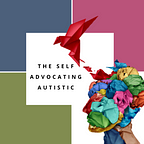A Silent Order
A sensory reset
Did your old school teachers ever make you line up and put your finger over your lips to be quiet?
Ciúineas (the Irish word for silence) would be relayed to us in my schooldays here in Ireland, as we were roared at to form an orderly line or sit quietly with the finger on the lip, expecting to act as a barrier to the leakage of words.
It was what would likely be a somewhat draconian measure now that I, however, as an undiagnosed autistic child, couldn’t get enough of. That was one game I knew how to play so well because the rules were literally part of my DNA. They were embedded in the core of my now-conscious autistic self.
My nervous and sensory systems would quietly be jumping for joy. I was that kid who, when this ‘rule’ was enforced, felt a little reprieve in my overstimulated school day as the other kids did their best to quieten themselves and conform.
The funny thing now, on reflection, is that when I was seven years of age and made my holy communion (ugh), I was picked to visit a silent nun’s order. I vividly recall the letter coming home in my schoolbag and handing it to my parents, beaming with pride that I was chosen with four other ‘quiet’ children. It was possibly one of the only days I skipped for joy leaving school and wasn’t in school avoidance mode the next day on returning, but that didn’t last long. I regularly entered and exited school in tears, and I seldom attended.
Now, naturally, the teacher chose us for this reason: they had an agenda. Pick the silently inclined kids who will resist the urge to speak when told not to do so.
Reasonable impulse control — I call that and not a developmental disorder. I asked my dad recently, whose short-term memory is declining somewhat but whose long-term memory is sharp if he considered me late to speak as a child.
He said possibly, but it wasn’t that I couldn’t talk. He felt it was because I just chose not to. I listened, absorbed, and processed everything intensely and vividly back then, as I still do now. I can recall vivid childhood memories from an early age that stemmed from silent observations. My brain perhaps couldn’t deeply process if dually engaged in talk and translation of my environments to myself.
From my lived experience, there is a difference between being nonverbal, selective mutism and choosing to be silent autonomously and contently. I would read aloud in class proudly, reading beyond my years, and I had high verbal reasoning scores.
But to date, even now, at 48, many still don’t believe that I seldom speak. My husband will tell you I can sit for hours silently, I can observe people for hours on end silently and without needing to engage in conversation, something like hyperfocused voyeurism, and I can sit in my head with my thoughts for hours, mostly contently.
On the other hand, when I am asked to speak occasionally, and I choose to engage, that is sometimes where my regulation can go wirey. So, I might struggle to know when to stop. I seldom interrupt, but I can tangent talk.
I do see my oral autonomy as a strength, but many in psychology and society may view it as detrimental to my development since my childhood. I do understand that much research can confirm this, but you see that it is subjectively cohort-dependent.
For some of us, it is just not that straightforward. What others see as detrimental, I can wholly say, has been protective on many levels for me.
We are constantly ushered into measuring ability and inability by milestones. I measure it now with my own conscious stones, step by step, based on my individual needs.
Grá Mór
